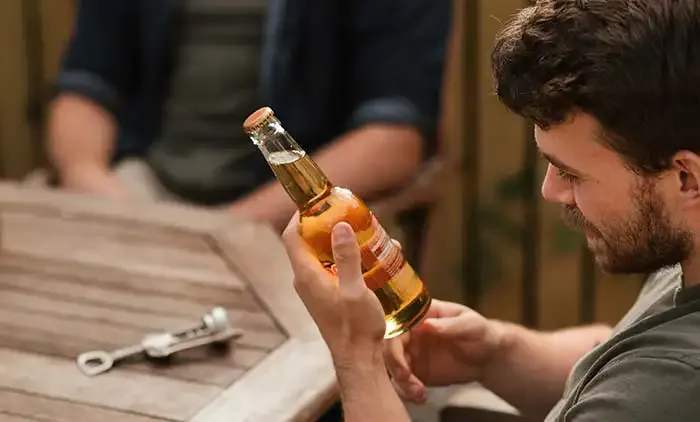What are zero alcohol drinks?
‘Zero alcohol drinks’ is essentially marketing terminology for ‘products mimicking alcohol’, which can be defined as:
A beverage containing less than 0.5% alcohol by volume (ABV) that features the branding of established alcohol companies, and/or is designed to imitate the flavour, packaging, or overall appearance of alcohol products.

Other names include:
- zero alcohol products
- zero alcohol beverages
- alcohol-free drinks
- no alcohol drinks
- non-alcoholic drinks or non-alcoholic beer/wine/spirits.
Although commonly used, these terms are technically incorrect.
They fail to capture two important points:
- some of these products contain small amounts of alcohol
- these products are specifically designed to imitate the flavour and appearance of alcoholic drinks. For instance, while Coca-Cola could technically be classified as a ‘zero alcohol drink’, it is clearly not trying to copy – or mimic – products containing alcohol.
Although recognising it’s technically incorrect, we will also use the term ‘zero alcohol drinks’ here for simplicity.
Zero alcohol beers and wines have been sold for decades, but companies are now claiming better flavour and quality and they have also started copying craft beers and spirits.3
Zero alcohol drinks are being sold in store and online by existing alcohol companies as product extensions (e.g., Heineken 0.0 or Carlton Zero), or by new companies who specialise in zero alcohol drinks.
They’re also available in many supermarket and grocery store chains
The most recent National Drug Strategy Household Survey in 2019* revealed some interesting trends on how we’ve changed our drinking patterns over time:
- 52% of people were taking action to reduce their drinking – the highest it’s ever been
- half of those (52%) wanted to cut back on drinking to improve their health
- the number of people drinking daily and weekly was at its lowest point since 2001
- the actions people took to reduce their drinking included:
- having less drinks on a drinking occasion
- reducing the overall number of drinking occasions
- stopping their drinking altogether
- drinking more low-alcohol drinks.4
These results suggest there’s increasing awareness of the health risks posed by alcohol, and many people are looking for ways they can reduce this risk.
*The National Drug Strategy Household Survey is held every 3 years. The next survey is schedule to be done this year – so the current data is subject to change.
Are zero alcohol drinks a healthier alternative?
This depends on how people choose to drink them.
For people who are looking to cut back their drinking, but like the taste of alcohol or enjoy the social or habitual aspects of drinking (e.g., having a drink after work or with meals), drinking zero alcohol products instead of alcoholic drinks could be a good alternative that’s more beneficial for their health. This would be known as substitution.
However, if these products are being consumed in addition to alcohol, rather than as a substitute – it is unlikely to provide much health benefit. For example, someone might have a zero alcohol drink instead of a soft drink or coffee, or in situations where they wouldn’t usually drink any beverage (for e.g. while driving). In either of these scenarios, the persons regular alcohol consumption is unaffected.
Zero alcohol drinks may also be risky for people who have previously experienced issues with alcohol.
Exposure to drinking cues and drinking settings has been found to be a strong predictor of relapse among abstaining drinkers. As most products have a near identical taste, smell and appearance to alcohol, they could be a potential trigger for someone who has recently given up drinking.5
Sober in the Country’s Shanna Whan highlights the inherent tension posed by zero alcohol drinks.
As someone who previously experienced a dependence on alcohol, she reflected that: “I see a tremendous fit for zero-alc options in our backyard in the bush, and the many benefits of choice.”
But, at the same time, she revealed she suffered a near-fatal relapse from consuming zero alcohol products. She said: “I simply never even thought it through…how using an imitation option could play out.”5 She goes on to state that “It’s also deeply concerning to see people marketing them as a great way to cut back on alcohol. For some it absolutely can be. For others – it’s a disaster. And that distinction MUST be made.”5